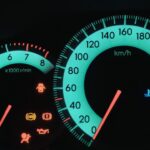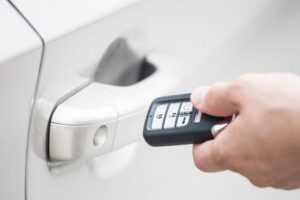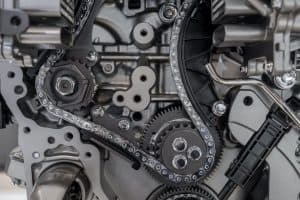You are putting a lot of stress on the brakes each time you step on the brake pedal. Heat is produced as the brake pads apply friction to the rotor so your car can slow down. If you skip on its maintenance, you will have a problem. In this article, I’ll discuss squeaky brake pedal – causes and how to fix them.
The brake pedal can squeak when you take your foot off the brake. It is possible that the brake pads or the brake calipers have hanged up and slowed down the retreat of the pads as you release the brakes. Or perhaps the ‘anti-squeal’ spring behind the brake pad is loose and vibrates, producing the squeaking sound.
As you continue to drive your car, there’ll come a time when the brake pads will wear out. You need to replace them. If you hear your brakes squeaking each time you step on the brake pedal, it’s time to change the brake pads.
Read on to learn more about the squeaky brake pedal, what causes this problem and how you can fix it.
Squeaky Brake Pedal Overview
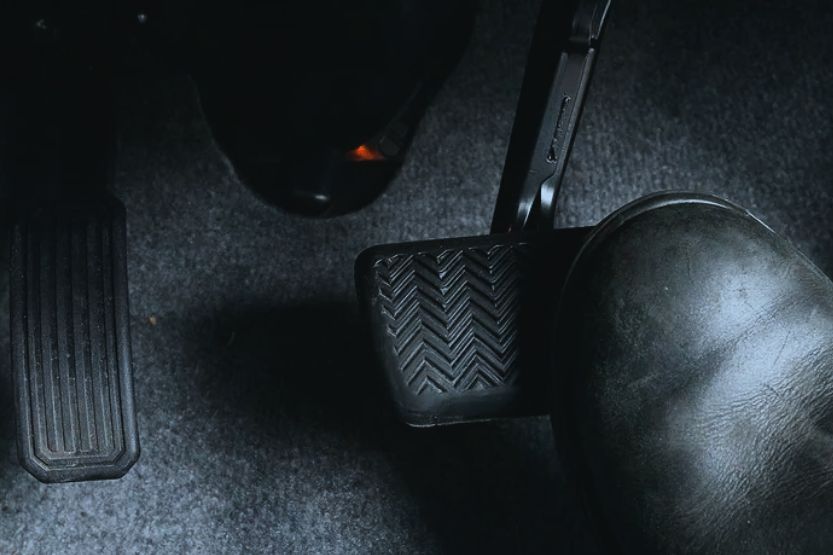
The brake pedal can squeak when you take your foot off the brakes. One of the things that can happen is that the brake pads or the brake calipers have hung up.
When that happens, the retreat of the brake pads when you release the brakes will slow down. Or probably, the ‘anti-squeal’ spring on the back of the brake pads vibrates and causes the squeaky sound.
The usual cause of squeaky brake pads is worn brake pads. As you continue to drive your car, the brake pads will wear out because every time you step on the brake pedal, the brake pads will come in contact with the rotor. This produces friction which serves to slow down your vehicle.
These dynamics happen each time you step on the brakes. So, it will not be hard to see that the brake pads will wear out over time.
When the pads are almost consumed, there will be metal-to-metal contact between the brake pad’s metal base and the rotor made of metal. That’s when you will hear the squeaking sound.
While you can still drive your car with squeaky brakes, it is not advisable because of the noise it creates. It is also unsafe to do so.
You should have the brake calipers checked and repaired or replace the worn-out pads immediately. If you have this problem, the longest you can drive a vehicle is a day or two.
What Causes Your Brake Pedal to Squeak?
When a part of your car’s brake system is having a problem, one of the results is a squeaky brake pedal. Many car braking system problems are mainly due to ordinary wear and tear. So, you need to know what causes this thing to happen.
Here are some of the reasons why your brake pedal is squeaking each time you release or step on your brakes:
1. Stuck Brake Pads or Brake Calipers
One possible reason your brakes squeal is that the brake pads or calipers got stuck or hung up. What will happen is a squeaky brake pedal when released. When this happens, it will slow down the retreat of the brake pads when you release the brakes.
2. Loose Brake Pads
Another possible reason your brakes squeal is that the brake pads are loose from their metal bases. If this is the situation, the brake pads vibrate when you step on the brakes. This is the situation that produces the squeaking sound.
3. Worn Brake Pads
You will be forced to step on the brakes as you continue driving your car. Over time, the friction between the brake pads and the rotor will eat away the material that the brake pads are made of.
There’ll come a time when the brake pad material will be so thin that its base metal gets exposed. When you step on the brakes, instead of the brake pad contacting the metal rotor, the exposed base metal of the brake pad comes in contact with the metal rotor.
So, there will be metal-to-metal contact. That is when you will hear the squeaking sound.
4. Dry Brake Pedal Joints
The components of your car’s braking system need lubrication because they are always activated every time you use your car’s brakes. When you hear your brakes squeaking, some parts of it are probably not adequately lubricated.
To get rid of the sound, you need to check what part of the braking system the sound is coming from. Then lubricate that part. You have solved the problem if the sound goes away when you step on your brakes.
5. Uneven Brake Rotors
If you notice squeaking sounds after you’ve changed the brake pads, then it must be a problem with the brake rotors. Brake rotors can also wear out over time. Like brake pads, they are subject to heat and stress each time you step on the brakes.
So, there will be imperfections on the rotors’ surfaces. Even if you have new brake pads, they won’t be able to match the shape of the surfaces of the rotors. That’s why you will hear squeaks as you step on your brakes.
To solve this problem, you need to re-surface the old brake rotor. If that can’t solve your problem, you must replace the rotor altogether.
6. Rusted or Wet Brake Rotors
If it starts to rain hard while driving, you can’t prevent your brakes from getting wet. Moisture that gets to the rotors will cause them to rust. If the moisture is allowed to stay on the rotors for a long time, rust will develop on the rotor’s surface.
Loose particles from the rusted parts of the rotor can get caught in the brake pads. When this happens, you will hear squeaking when you step on the brakes.
But as you continue to drive your car, this sound will go away after making a couple of hard stops. However, if the sound persists, you have to bring your car to your trusted mechanic and have it checked.
7. Worn Out Brake Line
If you have an old car, its brake line must also be old and worn out. A worn-out brake line can also cause a faint squeaky sound every time you step on your brakes. If this brake line is already old, it can get ruptured.
When that happens, the hydraulic fluid from the master cylinder to the brakes will drain, leaving your car without any braking capability. That is a very dangerous situation. You should have the brake line replaced at once by your trusted mechanic.
8. Ceramic or Metallic Brake Pads
Modern braking systems use different innovative materials, such as ceramics and special metals, for their brake pads.
If your car is using ceramic or metallic brake pads, you may hear squeaking sounds from the brakes from time to time. However, some car experts say that this is usually harmless.
9. Incorrect Tension in the Brake Cable
If you have checked your brake pads and assessed that they are not the ones causing the squeaking sounds, you can still hear the squeaky sound; probably, the brake cable is loose.
This problem can be fixed by adjusting the tension of the cable. The best person to do this is a qualified mechanic.
10. Poor Installation and Cheap Parts
Incorrect installation and cheap parts can also cause squeaking sounds on the brake pedal. Not properly lubricating the brake caliper can be considered improper installation.
This will result in the caliper getting stuck. It will reduce braking power and eventually cause premature wearing of the brake pad.
11. Foreign Objects Getting Caught in the Brake Pads
When you step on your brakes, foreign objects finding their way into brake pads can also cause a squeaking noise.
As you drive down the road, pinecones, twigs, and small stones can get stuck between the rotor and the brake pad. If this is the cause of the squeaking noise, you need to get the foreign objects removed at once before they damage the rotor.
Again, why does your car has a squeaky brake pedal? Your vehicle has a squeaky brake pedal due to worn-out brake pads. When you hear this noise, it means it’s time for a brake pad replacement.
How to Fix Squeaky Brakes
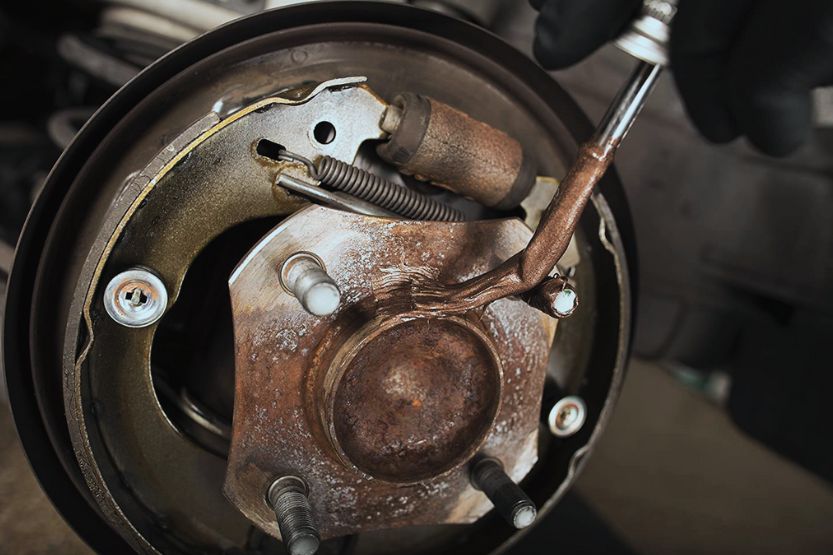
Now that you know the possible causes of the squeaky sound you hear when you step on your brakes, you also need to know how to fix a squeaky brake pedal.
When trying to fix these issues, always be aware that serious brake problems need to be fixed immediately by a qualified mechanic.
With that said, here are some of the common fixes for squeaky brake pedal issues:
1. Use Aftermarket Brake Parts
One of the best ways to eliminate harmless brake pedal squeak sounds is to upgrade to aftermarket brake pads. A lot of these aftermarket brake pads are designed to minimize noise. Your trusted mechanic will be able to recommend the best aftermarket brake pads that you can use.
2. Use Anaerobic Adhesives
Anaerobic adhesives can bond well to metals and will prevent squeaky noise in brake pedals and brake pads. Before using it, you must remove and clean the brake pad and caliper.
Then put some adhesive on the piston. Do this only if you can disassemble and assemble the brake components. These adhesives are also known as anti-squeal adhesives.
When applied to the brake pad, they act as damper pads. The adhesive forms a sticky film that absorbs the vibrations that produce the squeaky car brake pedal noise.
3. Use Lubricants
Using brake lubricants is similar to lubricating a squeaky door. It will make the squeaky noise go away from your brake pedal. These lubricants are available in sprays, cans, and tubes. They can take care of squeaky noises caused by foreign objects, dust, and rust.
4. Check the Shims
Shims are used to prevent friction between the brake pads and the rotors. They are located between these two brake components. Shims are used to ensure that the brake pads and the rotors are always aligned.
If the shims are correctly installed, you will hear very little noise from the brake pads and the rotors. So, you must check the shims if you hear squeaky sounds from the brake pedal. If they are already worn out, you need to replace them.
5. Practice Good Driving
Your style of driving also impacts your braking system. For instance, if you frequently carry heavy loads and drive up and down the hills, there will be a high probability that your brake pedals will squeak every time you hit the brakes.
If you are required to tow heavy loads and drive up and down the hills, you can still manage your driving style to minimize the chances of experiencing a squeaky brake pedal. Here’s what you can do:
- When driving down steep hills, use engine braking instead of stepping solely on the brakes the whole time. Downshift into a lower gear once you start your hill descent.
- Reduce brake pressure by limiting your heavy loads.
- Always use a safe distance between your car and the vehicle in front. This will help you avoid overusing or slamming your brakes, especially in congested traffic.
6. Replace Brake Pads Regularly
Brake pads have limited life spans. There will come a time that you need to replace them even if you have some options not to. The recommendation by car experts is that brake pads should be replaced every 50,000 miles.
How Much Will It Cost to Fix a Squeaky Brake Pedal?
A general inspection of a car’s brake system usually costs from $80 to $115. Labor charges constitute a significant part of the cost. The actual cost of your brake check, repair, or replacement will also depend on the model, make, and year of your car.
Replacing new brakes usually costs around $300 per axle, including parts and labor. Brake caliper replacement usually costs from $600 to $900. If the rotor needs to be replaced, the average cost runs from $300 to $400.
The average cost of a new brake drum can be between $200 and $230. If brake shoes need to be replaced, the cost can range from $250 to $300.
Frequently Asked Questions
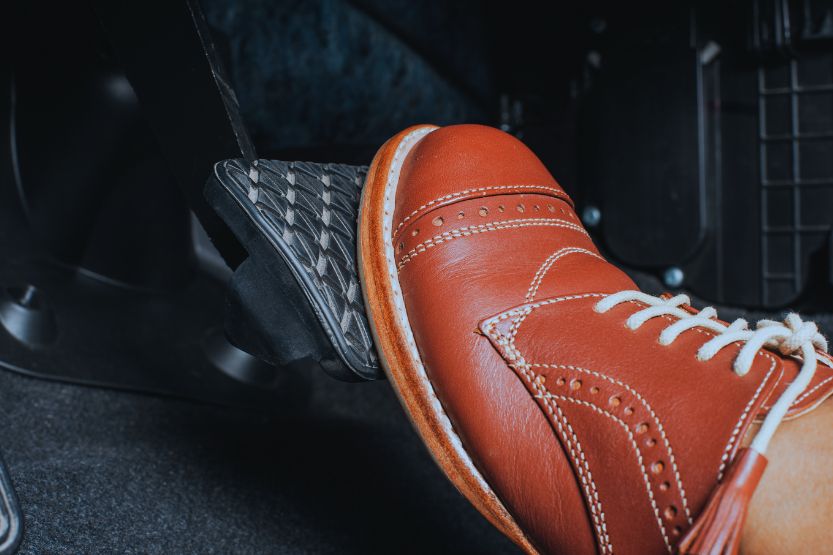
Here are the answers to the most often asked questions about this topic. If you still have some questions about the squeaky brake pedal, perhaps you will find your answers in the ones listed below:
Why Is My Brake Pedal Squeaking When I Release the Brakes?
Perhaps, your brake pedal is squeaking because the brake calipers or the brake pads are stuck or hanging up. If they are in this condition, it will slow down the retreat of the brake pads when you release the brakes.
Another reason your brake pedal squeaks is that the ‘anti-squeal’ spring at the back of the brake pads vibrates and causes squeaky noise.
What Is the Most Common Reason Why Brake Pedals Squeak?
The most common cause of a squeaky brake pedal is worn brake pads. As you continue driving your vehicle, you will step on the brakes to slow down or stop altogether. Over time, the brake pads will wear down.
When that happens, the base metal of the brake pads will be exposed. So, when the brake pads come in contact with the rotor as you step on the brake pedal, there will be metal-to-metal contact. This produces a squeaking noise.
How Long Can I Use the Brakes When It Starts to Squeak?
Not very long. If your brakes start to squeak, you should have them checked and replace the worn-out components immediately. Your brakes are your first line of defense. So, don’t drive too long with a squeaking brake pedal for safety.
Is It Bad to Have Squeaky Brakes?
If you value your safety, yes, squeaky brakes are bad. In a sense, having squeaky brakes is better than not being able to stop because of a bad braking system. Squeaky brake noises warn you that something is going wrong with your brakes.
Perhaps you only need to lubricate the brake components. If the noise persists, you may need to have it checked by a qualified mechanic before the problem becomes more serious.
In Closing: Causes of Squeaky Brake Pedal
Your brake pedal can squeak when you take your foot off the brakes. One of the possibilities is that the brake pads or the brake calipers have hung up. When this happens, it will slow down the retreat of the pads as you release the brakes.
Another possibility is that the ‘anti-squeal’ spring behind the brake pad is loose and vibrates. This produces a squeaking sound. You also need to know that the most common cause of squeaky brake pedals is worn-out brake pads.
As you continue driving your car, there’ll come a time when the brake pads will wear out. If you hear your brakes squeaking every time you step on the brake pedal, it’s time for you to replace the brake pads as soon as possible.


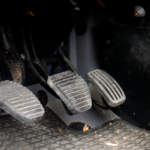

![Electric Parking Brake Problems [Causes and How to Fix] electric parking brake problems](https://roadsumo.com/wp-content/uploads/2022/05/electric-parking-brake-problems-150x150.jpg)
![Brake Lights Won’t Turn Off [Causes and How to Fix] brake lights wont turn off](https://roadsumo.com/wp-content/uploads/2021/05/brake-lights-wont-turn-off-150x150.jpg)
